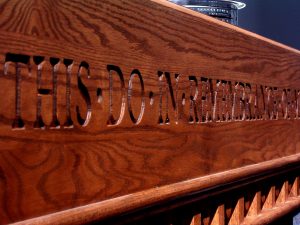 This coming Sunday we will participate together in the Lord’s Supper. This is no small privilege. Christians of previous generations employed much ink and spilled much blood over this ordinance.
This coming Sunday we will participate together in the Lord’s Supper. This is no small privilege. Christians of previous generations employed much ink and spilled much blood over this ordinance.
However, to a world not familiar with Christianity—a Muslim from Iran or Hindu from India—the Lord’s Supper seems strange. It does. Always has. After all, in the first century, Christians were accused of cannibalism because they said they consumed the body and blood of Christ.
In light, then, of this “strange privilege,” why do we partake of the Lord’s Supper? What value is there in doing so?
We could list many reasons, but I want to mention one: it is a testimony to the historic reality of Christ’s work. Here is what I mean.
Christ’s death is an actual event in history. It is not a fairy tale, fable, or myth. It actually happened. How do we know? The Lord’s Supper.
Jesus instituted the Lord’s Supper before he was crucified (Matt 26:26-30). And thus, the celebration of the Lord’s Table has been practiced for the last two thousand years throughout the history of the Christian faith.
Christians have been participating in the Lord’s Supper since the very beginning because in doing so, we “proclaim the Lord’s death” (1 Cor 11:26). When we participate in the Lord’s Supper, we are proclaiming a historic reality took place—“the Lord’s death.” The bread and juice represent Christ’s death, and thus the elements point to the fact that Christ’s death surely did happen as historic fact.
So when we partake of communion this Sunday, we not only join millions of Christians throughout the centuries in celebrating an ordinance of Christ, we also are doing something more. In a sense, we are witnessing a sort of “documentation” to the reality of the historical death of Jesus of Nazareth.
And when you need to defend the historic claims of Christianity, don’t forget the rite we participate in on a monthly basis: the Lord’s Supper.